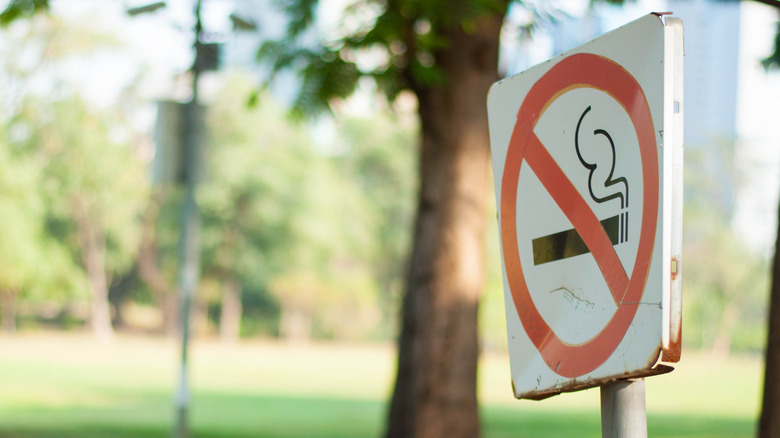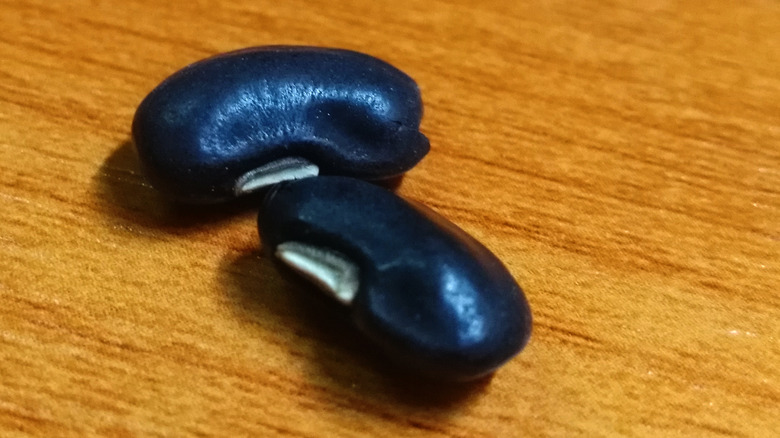7 Things You Should Do And 7 You Shouldn't If You Want To Live To 100
We may receive a commission on purchases made from links.
When I was 18, my best friend and I decided to visit a psychic as a last hurrah act of silliness before heading off to college. On our way there, I debated the merits of asking how old I'd live to be: did I want to know ("know" being a very generous term here), or would it freak me out too much? I decided not to ask, knowing that my anxious tendencies would go bananas with even a hint of speculation about my lifespan.
While, obviously, answers about how long we're going to live don't have merit if they don't come from a highly trained physician, there are some clear steps people can take to improve their chances of living long, healthy, and happy lives.
Don't smoke
Let's start with the glaringly obvious: don't smoke. Smoking, as we all know by now, has a strongly negative impact on overall health. According to the Centers for Disease Control and Prevention (CDC), smoking causes nearly one in five deaths per year in the United States. As the CDC notes, smoking-related illnesses like lung cancer, coronary heart disease, chronic obstructive pulmonary disease (COPD), and stroke kill more people each year than AIDS, car accidents, firearm-related deaths, alcohol use, and illegal drug use combined.
Smoking also increases the risk of cancer throughout the body — in fact, the Smithsonian Magazine notes that in a 2016 study by the Wellcome Trust Sanger Institute and the Los Alamos National Laboratory, "Researchers found deep molecular 'signatures' etched in tumor cells, even in organs that were never exposed to cigarette smoke directly. Each of the signatures, showing how DNA has been damaged, is a potential start point for a future cancer... The researchers were then able to quantify exactly how fast smoking mutates cells by correlating the number of mutations with self-reported smoking habits. For a pack-a-day smoker, they found, each year of smoking causes 150 extra mutations in every lung cell. These were all copies of the same mutation; the more mutations, the more likely that the cell would become cancerous."
Yeesh. Y'all don't need me to tell you this, but it bears repeating: if you smoke, do your best to quit, and if you don't smoke, don't start.
Don't spend most of your day sitting
Sitting is, according to researchers, one of the great scourges of modern life. (Hey, it used to be things like bad sanitation, so I guess every era has its downsides.) According to an article published in Women's Health, "research has found that inactivity can also damage your mind, sleep cycle, and organs." (Fun!) "The human body evolved to move around," James Levine, M.D., Ph.D., a professor of medicine at the Mayo Clinic, told Women's Health. "Yes, there are times to sit, but we put our feet up now more than ever. It's unnatural and hazardous to our health."
Apparently that hazard is nothing to sneeze at: according to The Los Angeles Times, a meta-analysis published in the Annals of Internal Medicine revealed that sitting for prolonged periods of time increases the risk of obesity, cancer, cardiovascular disease, and overall mortality. If that doesn't have you bummed out yet, consider this: even in people who meet the recommended guidelines for physical activity — defined as 20 minutes a day of "moderately vigorous exercise" — their health suffered the more they sat. (*Sad trombone*)
Don't skip the sunscreen
One of the many indiscretions of my wasted youth is the fact that I spent entirely too much time running around outside without wearing sunscreen. This was a mistake. According to the Journal Sentinel, "Skin can burn in as little as 15 minutes... [and] although typical sunburns can fade in three to five days, which is barely a blip on the summer radar, the latent damage caused by the sun's high-energy UV light lasts much longer and accumulates over time."
Furthermore, recent research from the Wellcome Trust Sanger Institute in Cambridge, UK, showed that 25 percent of normal skin cells developed mutations after being exposed to sunlight — and, therefore, "could be on their way to becoming skin cancer." Oy.
Don't skimp on sleep
Another thing I'm very guilty of is not getting enough sleep, and when it comes to this, the odds are very much not in my favor. According to Harvard Medical School's Division of Sleep Medicine, long-term, chronic sleep deprivation can lead to issues such as obesity, diabetes, cardiovascular disease, and even early death. (Oh joy!) Sleep deprivation can hamper immune function, and it can also hurt the body's ability to regulate hormones related to stress response, hunger, metabolism, and mood.
"Considering the many potential adverse health effects of insufficient sleep, it is not surprising that poor sleep is associated with lower life expectancy. Data from three large cross-sectional epidemiological studies reveal that sleeping five hours or less per night increased mortality risk from all causes by roughly 15 percent," the Division of Sleep Medicine notes.
Don't abuse alcohol
Drinking is a bit of a tricky factor: it can be healthy in moderation, but drinking too much is unequivocally bad. For definitions on what constitutes moderate drinking and excessive drinking, the CDC notes that the most common form of excessive drinking is binge drinking. For women, this entails consuming four or more drinks during a single occasion, and for men, it involves five or more drinks during a single occasion. Heavy drinking is defined as consuming eight or more drinks per week for women, and 15 or more drinks per week for men.
Both heavy drinking and repeated binge drinking can carry long-term health risks, and according to both WebMD and The New York Times, such risks can include cancer, gastrointestinal disorders, mood problems, dementia, liver disease, cardiovascular disease, anemia, and increased risk for other addictions. So, keeping cocktail consumption within reason is a good call!
Don't neglect your mental health
While most of what I've focused on so far has been about physical health, taking care of your mental health is a critical component to increasing longevity. In fact, research carried out by psychiatrists at Oxford University notes that life expectancy is cut by ten to 20 years in cases of serious mental illness — a rate similar to the early mortality risk of heavy smoking.
According to Dr. Seena Fazel of the Department of Psychiatry at Oxford University, "We found that many mental health diagnoses are associated with a drop in life expectancy as great as that associated with smoking 20 or more cigarettes a day. There are likely to be many reasons for this. High-risk behaviors are common in psychiatric patients, especially drug and alcohol abuse, and they are more likely to die by suicide. The stigma surrounding mental health may mean people aren't treated as well for physical health problems when they do see a doctor."
So, mind your mind: no one would expect someone with a broken leg to fix it on their own, so if you're struggling with any aspect of your life, find a good psychiatrist and work with a therapist you trust. Your mental health is just as important as your physical health, and there's no shame in taking equal care of both your mind and your body.
Don't neglect where you live
This is another tricky topic, as many people have little control over where they live — neighborhoods are often chosen not based on factors like walkability or access to food, but based on affordability. With that in mind, it's important to note the caveat that this is something people can control if they have the resources and means to do it, which gets into all sorts of topics surrounding privilege, socioeconomic status, and lots of other thorny issues. That said, in cases where people can choose where they live, neighborhoods can have surprisingly large impacts on health and longevity.
Dan Buettner, author of The Blue Zones Solution, said in an interview with National Geographic, "Statistically speaking, where you live is the biggest, non-genetic influence on how healthy you are. If you're living out in a suburb around a forest of junk food places, you're not going to escape un-healthiness."
He continued, "You can live in a place like Binghamton, where about 37 [percent] of the people are obese and they have very lax food policies. Or you can go to a place like San Luis Obispo, where there is 11 percent obesity and their leaders said a long time ago: we're going to bring in policies that help our people eat better." Living in a neighborhood where you'll have places to walk, be outside, and be active is also conducive to better health.
Do see female doctors
This one was a surprise when I was doing my research: I thought that just seeing a doctor predicted better outcomes, but it turns out that older patients who see female physicians tend to live longer than their counterparts whose doctors are men.
According to a study published in the Journal of the American Medical Association (JAMA), upon examining data on hospitalized Medicare beneficiaries, researchers "found that patients treated by female physicians had significantly lower mortality rates and readmission rates compared with those cared for by male physicians within the same hospital." Once you reach that stage in life, having the right doctor matters even more than we thought!
Do eat lots of beans and fresh produce
Dan Buettner, a National Geographic Fellow and author who set off on an around-the-world epic quest to determine what helps people live to 100, distilled his research into a book titled The Blue Zones: Lessons for Living Longer From the People Who've Lived the Longest. In it, he noted that in blue zones, or areas with significantly less disease and significantly longer life expectancy, people often eat lots of fruits, veggies, and beans.
"Beans, including fava, black, soy and lentils, are the cornerstone of most centenarian diets. Meat — mostly pork — is eaten on average only five times per month," according to the Blue Zones website, which notes that a serving size is about three to four ounces, or about the size of a deck of cards.
So, despite the, shall we say, slightly stinky after effects that come from eating lots of beans, they are indeed (as the song goes) good for your heart.
Do get some exercise
As you may have guessed, exercise is a key component of living longer. According to research conducted at the Cooper Institute in Dallas, Texas, and published in The New York Times, various forms of exercise "reliably benefited life expectancy...[w]alking, cycling and other activities... typically dropped the risk of premature death by about 12 percent."
Now for the even better news (or the super awful news, depending on how you feel about this): the most beneficial and life-extending form of exercise, according to the Cooper Institute's research, is running. "Running may be the single most effective exercise to increase life expectancy... compared to nonrunners, runners tended to live about three additional years, even if they run slowly or sporadically and smoke, drink or are overweight," notes the same New York Times article.
But! For those who only run if chased, there's a bit of hope here: you don't have to run for long to reap the benefits. According to separate research by the Cooper Institute which was also published in The New York Times, "Running for as little as five minutes a day could significantly lower a person's risk of dying prematurely... [t]he findings suggest that the benefits of even small amounts of vigorous exercise may be much greater than experts had assumed." So, lace up those kicks and run whenever you can!
Do take care of your teeth and gums
While it's often easy to write off dental health (please tell me I'm not the only one with an irrational hatred of flossing), it actually has a strong correlation with life expectancy. Retrospectively analyzing data from women over 55 who had enrolled in a large health study, scientists found that the women who had gum disease or tooth loss also had an increased risk of early death.
"The study controlled for many factors, including age, smoking, education level, body mass index, physical activity and history of diabetes, high blood pressure and high cholesterol, according to an article on the study published in The New York Times, and even though the study could not determine cause and effect, "the data 'do suggest that women who have lost their teeth have a higher risk for death, even at later ages in life,'" according to Michael LaMonte, a University of Buffalo epidemiologist and the study's lead author.
Do maintain a strong social support network
One of the best things you can do to bolster your mental health is to have a strong social support network. According to a study published in PLoSMedicine and discussed in a Scientific American article, having a strong social support network — whether through friends, family, or colleagues — "turns out to be just as good for long-term survival as giving up a 15-cigarette-a-day smoking habit."
Additionally, interpersonal social networks appear to play an important role in maintaining physical health. Teresa Ellen Seeman, professor of medicine at the UCLA School of Public Health, noted in The Los Angeles Times, "As humans, we have many different regulatory systems — blood pressure, metabolism, stress hormones. There are data that suggest all these systems are affected by social relationships. People who report more supportive and positive social relationships have ... lower blood pressure, lower cholesterol levels, better glucose metabolism and lower levels of various stress hormones."
This goes hand-in-hand with another finding from Buettner's Blue Zones. According to his research, people on the Japanese island of Okinawa have what are called moai: groups of about five close friends or relatives who are "committed to each other for life." Like a lifetime brain trust, this group of besties "provides secure social networks. These safety nets lend financial and emotional support in times of need and give all of their members the stress-shedding security of knowing that there is always someone there for them," according to the Blue Zones website.
Do find meaning
One of the other key steps you can take to shore up your mental health, and thereby improve your physical health, is to find meaning. The Japanese refer to this as ikigai, and it's loosely translated as "a life worth living." According to a study published in Psychosomatic Medicine: Journal of Biobehavioral Medicine, "people who have a higher sense of purpose in life are at lower risk of death and cardiovascular disease," according to Science Daily. "While the mechanisms behind the association remain unclear, the findings suggest that approaches to strengthening a sense of purpose might lead to improved health outcomes."
Evidence pointing to the importance of ikigai and meaning first started appearing in the 1970s, according to Lifehacker. When physician Robert Butler published Why Survive? Being Old in America, he and his research team found that a sense of purpose was key to a long and healthy life: not only did people with a clearly defined, strong sense of purpose live longer than those who reported not having one, but people "who woke up each morning with clear goals for their life" also had a higher quality of life than their peers.
Do relax
Last but definitely not least, my favorite recommendation: relax whenever you can! Let's get the gnarly, unpleasant stuff out of the way first. According to research conducted by the University of California San Francisco, a hormone related to longevity is lower in women under chronic stress — so it's safe to say that this doesn't bode well for life expectancy and sustained stress. Furthermore, Harvard Med School's Harvard Health Publications notes that chronic stress can lead to health issues such as high blood pressure, immune system suppression, and increased anxiety and depression.
So, what's a gal to do when times are tough? The Harvard experts recommend simple deep breathing techniques that can help take the edge off your fight-or-flight response, noting, "Deep abdominal breathing encourages full oxygen exchange — that is, the beneficial trade of incoming oxygen for outgoing carbon dioxide. Not surprisingly, it can slow the heartbeat and lower or stabilize blood pressure."
In addition to deep breathing, an article published in Psychology Today makes the case that stress relief and relaxation can come in many forms. "Active breaks from your routine will give you the same energy you need to continue taking on the world. It doesn't matter what form your idle time takes, as long as it's not destructive...Pick whatever day and time works best for you, and make it a plan. By committing to take some time for yourself and for those you love, you are giving yourself and your family a gift."
Live long and prosper
Here's the thing about aiming for 100: the list of things not to do can seem overwhelming. It seems like there's often a "don't do this, don't do that" motif when it comes to health advice. (My inner monologue after reading health news usually consists of "everything is carcinogenic/poisonous/filled with death, and we're all dooooooomed!") But it can help to think of these things not as a list of things that are heaping on the doom, but rather a list of things that you can do. It's empowering to examine the things that you can do in order to give yourself a good shot at a long life!
















